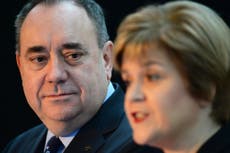Public trust ‘eroded’ by ministers flirting with post-Brexit cuts to food and animal welfare standards, report warns
Your support helps us to tell the story
From reproductive rights to climate change to Big Tech, The Independent is on the ground when the story is developing. Whether it's investigating the financials of Elon Musk's pro-Trump PAC or producing our latest documentary, 'The A Word', which shines a light on the American women fighting for reproductive rights, we know how important it is to parse out the facts from the messaging.
At such a critical moment in US history, we need reporters on the ground. Your donation allows us to keep sending journalists to speak to both sides of the story.
The Independent is trusted by Americans across the entire political spectrum. And unlike many other quality news outlets, we choose not to lock Americans out of our reporting and analysis with paywalls. We believe quality journalism should be available to everyone, paid for by those who can afford it.
Your support makes all the difference.Public trust has been “eroded” by ministers flirting with diluting food and animal welfare standards in post-Brexit trade deals, an official report is warning.
An independent commission – which trade secretary Liz Truss agreed to set up – demands that protections are maintained and calls for them to be enhanced, in the years to come.
But it also raps ministers for casting doubt on bans on low-quality products such as chlorinated chicken and for suggesting it was up to shoppers whether to buy them.
“With busy lives, people often don’t have the time to scrutinise what they buy and expect the reassurance that the government has this in hand,” it states.
“For some, this trust in the framework of standards has recently been eroded. High environmental, ethical and animal welfare standards that have been built up in our domestic food system, over many decades.
“They appear to be threatened by the potentially pernicious impact of signing agreements with countries whose food standards appear to be weaker than our own.”
The government refused to put in place a legal guarantee that EU standards will be maintained – and tried to deny the Commons a vote on the controversy.
A pledge that chlorinated chicken would be outlawed was dropped, before Ms Truss was forced to reinstate it after a revolt by Conservative backbenchers.
She was then forced to give teeth to the new Trade and Agriculture Commission, to make it properly independent, permanent and with the power to scrutinise each trade agreement.
In its first report, the Commission backs the government’s policy to liberalise trade in food and agriculture with other countries, following withdrawal from the EU.
But it tells ministers this should be balanced with a commitment to “international leadership by the UK on climate, environment, animal welfare and ethical trade”.
“We will not see a backsliding on standards. We are recommending very solidly that our standards remain,” said Tim Smith, its chairman and the former chief executive of the Food Standards Agency.
“We need to balance the need to be open to liberalised trade with the importance of long-established UK standards.”
Vicki Hird, of the coalition Sustain, welcomed the focus on protecting food standards, but added: “However, they seem to prioritise trade liberalisation over other considerations.”
The National Farmers Union also welcomed the report, but said the government must set out urgently “how those trade-offs are managed and weighed”.
One trade expert, David Henig, said the report showed “the Commission couldn’t actually agree on a way forward “ and was “an opportunity missed”.
“No potential solution is likely to be acceptable to both farmers and supporters of a US trade deal among the members,” he warned.






Join our commenting forum
Join thought-provoking conversations, follow other Independent readers and see their replies
Comments